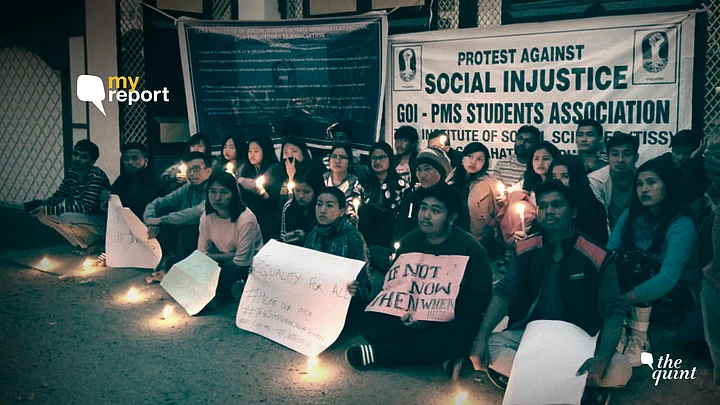A hunger strike called by students of the Tata Institute of Social Sciences (TISS), Guwahati, against withdrawal of fee waivers for those belonging to economically weaker sections came to an end after 48 hours of negotiations on Monday, 28 January.
As part of an on-campus protest that began on 17 January against privatisation of education and increase in hostel and dining fees, 13 students eligible for the Government of India-Post Matric Scholarship (GoI-PMS) went on a hunger strike on Monday.
For the past 13 days, over 60 students of the GOI PMS students’ association protested, rallied, boycotted classes and shouted slogans to voice their demands and rights. Around 66 percent of the students of TISS, Guwahati, are from the Northeast, most of them belonging to the Scheduled Tribes (ST).
Agreement Reached with Administration
Due to lack of funds from the government, the waiver was lifted last year, after which the students protested in February 2018. The result of this protest was that only the 2017 batch received the fee waiver. A student told me:
“When the protest first started, there was a mail from the SC/ST cell convenor, stating that we should find our own means of support for ourselves and that asking for a fee waiver was no longer possible. But our core demand has always been for a fee waiver for all GoI-PMS students.”Kabithui Rongmei
Kavitha, another student who was part of the protest, told me:
“The college was asking us to pay a total of Rs 40,000. I belong to a tea tribe, my parents pick tea leaves and make Rs 3,000 a month. They can’t afford this payment.”
After negotiations and discussion with the Deputy Director Kalpana Sarathy, SC/ST Convenor RK Debbarma and other faculty members, an agreement was made to ensure that GoI-PMS students apply for student aid fund and receive maximum to full financial support from the institute and other sources.
According to the agreement, those who will not be able to pay the asked amount can now pay in instalments and will not face any kind of academic discrimination on the basis of their financial capacity.
“I am satisfied with this agreement that’s come out. I was expecting a response from the administration and faculty within three days of the hunger strike. I knew we would not have to be on hunger strike for long. I stood up for four girls who come from financially weak families. This needed to be done.”Herili Sangtam, Member, GoI-PMS Association
Brinda Daulagupu, another member of the association who was also on strike, said that she was satisfied with the efforts made.
“I was frustrated this morning when the faculty asked us to call off the strike and we did not get enough support from our fellow students. Now that an assurance has been made, I feel content with the efforts made. I think that the hunger strike made an impact on the decisions made. But there is a bigger challenge coming up as we have to look for alternate sources of funds.”Brinda Daulagupu
Tikendra Rai Chelak, President of the GoI-PMS Students’ Association of the TISS, Guwahati campus, said:
“It would be better if the recommendation made by the National Commission for SC/ST in 2018 to waive off the hostel and dining fee for eligible students is implemented. We have negotiated now and made an agreement with the TISS faculty and admin. However, the fund cut by University Grants Commission (UGC) is not good for higher education in India.”Tikendra Rai Chelak, President of the GoI-PMS Students’ Association
Going forward, the students of the association will work along with the faculty and the administration to increase financial aid received by the institute and to ensure that students receive the amount needed.
(The author is a student at TISS Guwahati. All 'My Report' branded stories are submitted by citizen journalists to The Quint. Though The Quint inquires into the claims/allegations from all parties before publishing, the report and the views expressed above are the citizen journalist's own. The Quint neither endorses, nor is responsible for the same.)
